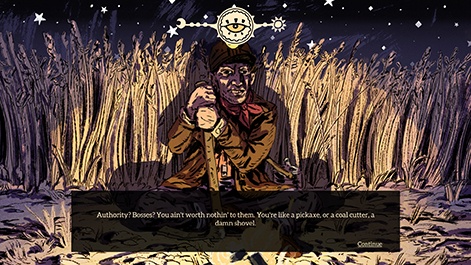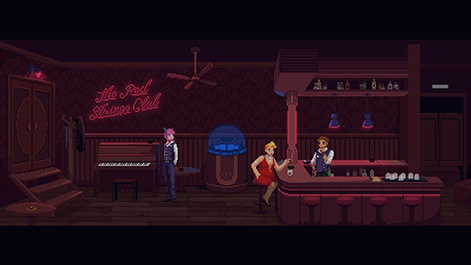The last time we sat down with Mike Wilson, the Devolver co-founder had just joined another indie publisher, Good Shepherd - formerly Gambitious - as its chief creative officer.
Since then, it's been something of a mixed bag for the latter publisher. Its most recent title, Where the Water Tastes Like Wine, has been something of a failure for the company.
"Where the Water Tastes Like Wine was an absolute heartbreaker for us and the developer, Johnnemann Nordhagen," Wilson says.
"It's disappointing. We were hoping that game would show what we were about; great writing, great music, great acting. It would have been fantastic to be a defining moment. The thing is we are really proud of the game. Johnnemann is determined to keep improving it even though he's also devastated as an artist. We're still proud to see that that game came from us. Anybody who experienced it, at least if you like that kind of game, will say that's a first-rate title. Clearly, the studio worked hard on really good acting, storytelling and music. We hope that those features will be coming in all of our titles. It's still an important one to be associated with us as we build the label."
As for what actually went wrong with the game, Wilson isn't really able to say.
"It's hard to say. We never bet on or assume that something is going to be a hit," he admits.
"That's both Devolver or Good Shepherd. It's a question of 'Do we reasonably think this game can turn out and does it need to exist?' We're a small company so we don't need things to be mainstream hits at all to do well. We certainly didn't expect it to just not launch. It was a failure to launch. We've had experience with games where it's more of a slow burn."

It's not just Good Shepherd that's had some bad luck recently; Wilson's other company, Devolver Digital, also had one of its titles, The Red Strings Club, fail to really hit the mark, despite being really well reviewed.
"Devolver had one that's equally shocking with The Red Strings Club that launched in January," he says.
"It's awesome, it's one of our best-reviewed games but it also didn't sell that well. It's doing better now because the studio keeps refining it. We keep pushing it within the Steam community. Both of those games are only on Steam for now, so it's really about working within that ecosystem. It's a sign that the market is definitely tougher and that it's not easy with these really creative pixel art narrative game compare to a few years ago."
Asking developers to continue working on a game after launch has paid off for Wilson's various indie publishers. This is a common thing with triple-A titles - which are often run for years at a time - but the industry veteran says it's equally as important for indies to support projects post-launch, especially when the game doesn't perform on Day One.
"We really encourage all of our developers to have a post-launch plan," he says.
"It's their IP and their studio name that's out there, first and foremost. Even if their game isn't a massive financial success, it's their thing out there and their name and their fans. It's part of the deal now. You can't ship something and walk away because it didn't do well. With Where The Water Tastes Like Wine, the developer was super frustrated. He was hoping to not be broke right now, but he made a thing that means someone will greenlight his next thing, it might be us. And he's committed to keep supporting the people who did buy it and to keep improving it.
"Strafe is a great example. It wasn't perfect at launch, a lot of people about what it actually was because they wanted it to be Quake and didn't pay attention to the fact it was a roguelike. They've turned their Steam reviews around from average 60s to average high 80s over the course of that six months. That's what people see. I love that about Steam, that they show recent reviews because it really does show the difference when a developer sticks to it. That Strafe team also wasn't expecting to be broke on launch. It's going to make money now. Hopefully, it'll be enough so they're not worried about making rent while they're making their next game."
The market is definitely tougher and that it's not easy with these really creative pixel art narrative game compare to a few years ago.
One of the common threads in Wilson's career is that developers are artists and should be treated as such. Not only this; they are the ones who should retain IP, not publishers.
This has been apparent in both Devolver and Good Shepherd, as well as his previous ventures, Gathering of Developers (GOD Games) and the fantastically-named GameCock Media. This stems from his first role in the industry at Texas-based Doom maker Id Software.
"Id was fighting that fight before anyone was even having that conversation," he says.
"It wasn't just about owning the IP, it was being branded on the front of the box. It used to be the case that the publisher was the only thing on the front. The name of the artist or the developer was in the fine print in the back. To us, it was ridiculous that anyone would have a favourite publisher. It's like: 'I love Capital Records or Random House, they're my jam'. If you look at Activision games, if you're a fan of Call of Duty, you're not necessarily going to be a fan of Skylanders. If you're a fan of a particular developer, however, then it's reasonable that you might like their next game. It was circumstantial and so obviously true.
"Developers are artists, first of all. Back then, they were being looked at as the new toy makers.They weren't being considered as entertainment artists at all. I got into the industry thanks to my buddy Adrian Carmack, who was a pen and paper artist that learnt MS Paint so he could make Doom. Then there's John Carmack, an engineer's engineer. Adrian cared about the art; John cared about beautiful code. I still consider that incredibly artistic. Elegant code is beautiful, it's like writing music."

With that in mind, we ask Wilson whether he feels that developers should unionise. This was one of the big topics to come out of GDC 2018 this year. While he doesn't think a 'traditional' union would work for games, as teams are often distributed across states and countries, triple-A developers need some kind of collective bargaining.
"I don't think a traditional union is going to work because it is a global industry," he says.
"Even in the US, the union would have to be different in each state. Then you have teams where the staff is distributed across five different countries, so that won't work. But, especially for the big studios, some sort of collective bargaining has to happen because these peoples' lives are being chewed up and spat out in the big studios through crunch and that culture. It's not always from the bosses, it's the peer pressure of everyone around you working 11-hour days. It's breaking people, it's ruining families, people are getting sick."
It's not just triple-A developers that need help; indies require support, too.
"On the indie side, where it's two or three-people teams, they're breaking themselves just from the immense pressure of everything being down to a few people," Wilson says.
"It really is personal. If it sucks, you suck. When people lash out at these artists online, a lot of people have no idea that it was one or two people who made a game for not nearly enough money and way too long. They just imagine that it's some company somewhere with their name on the side of a building."
Anxiety and depression are an epidemic now... Everyone in a position to raise the issue needs to keep raising the issue
On this subject, mental health is something close to Wilson's heart. In fact, four of the developers that he has worked with over the years have ended up being hospitalised due to mental health problems. As such, this is something that he feels there needs to be more awareness of and support for in the games industry.
"Everyone in a position to raise the issue needs to keep raising the issue," he says.
"I try and work it into every conversation now. That's just part of it - that general awareness, much like when we were trying to convince people that cigarettes were not the best idea. It takes a long time but eventually that becomes the truth and people realise. In a city like London, the idea that you could ban cigarettes from a pub would have been ludicrous. You'd have been laughed out of any room. But eventually, after you keep having that conversation and make people understand that getting sick is normal and if you are a smoker you might want to expect it. It's the same with mental health; this is 'a thing' and these are the resources that you need to figure out what your personal solution is to keep yourself out of the hospital.
"But also, use AFK rooms at conventions. They're a sanctuary for people. These shows can be an absolute assault on most people, especially if you have anxiety. Just creating a sanctuary space and acknowledging that the reason this space is here is that it's not just you. Again, it's just normalising it all and, again, providing more online resources.
"Peer therapy is becoming really popular for people who will never go to a therapist or can't afford one. Just talking to somebody online, who has been through it. More people who have been through it and come out the other side will want to help with that. Once you've been in that very dark place, if you come out, you certainly want to throw anyone you see a line.
"This is part of being a human being in this day and age. It's not unique to our industry. Anxiety and depression are an epidemic now. Everything is evolving so quickly, technology-wise and noise-wise, in the world that we can't possibly keep up. People are just breaking. There are a lot of reasons to be anxious."


















